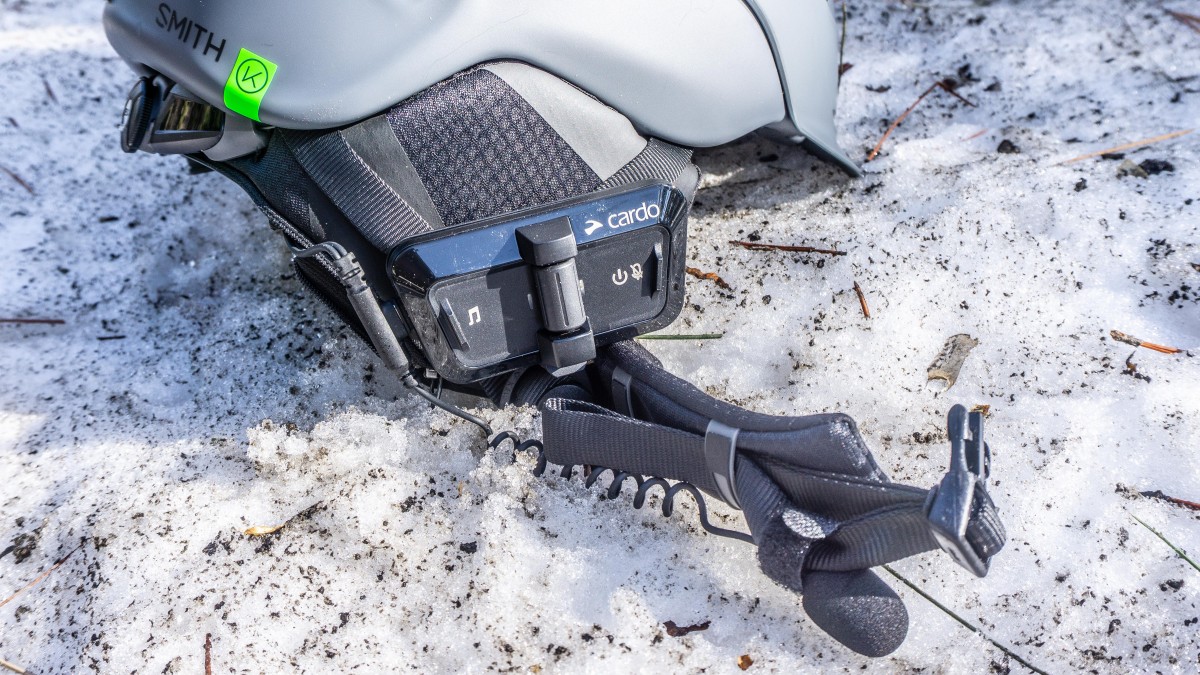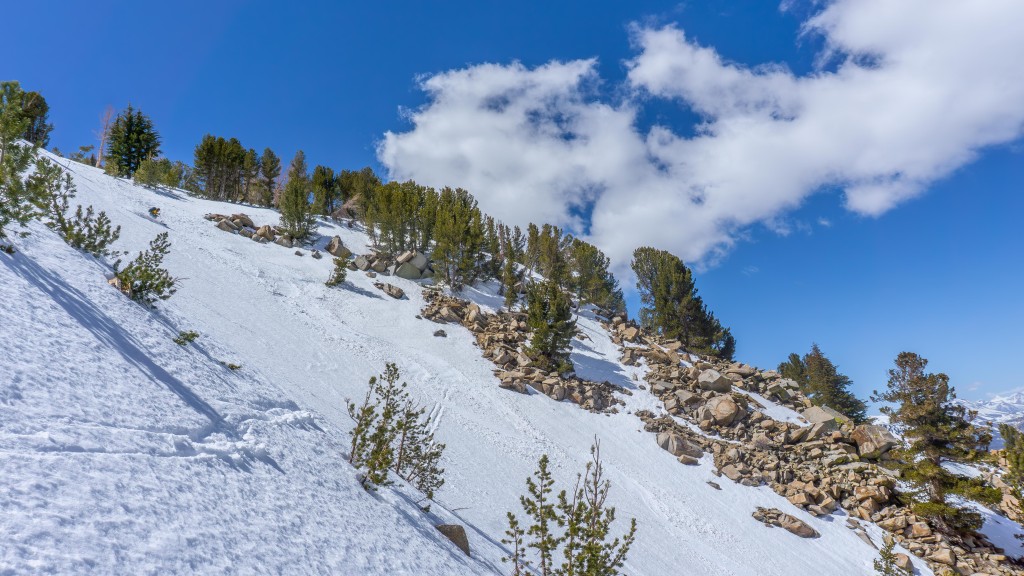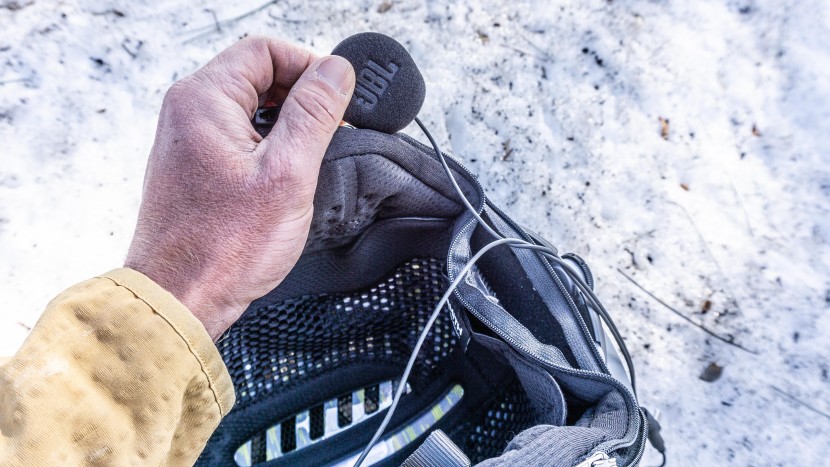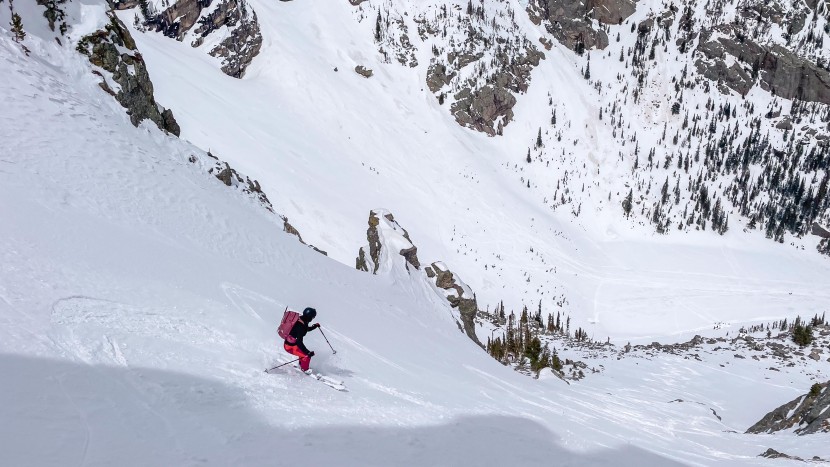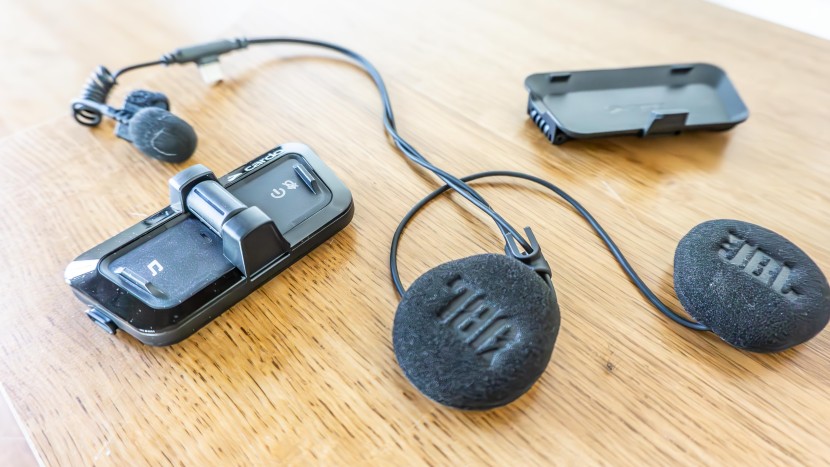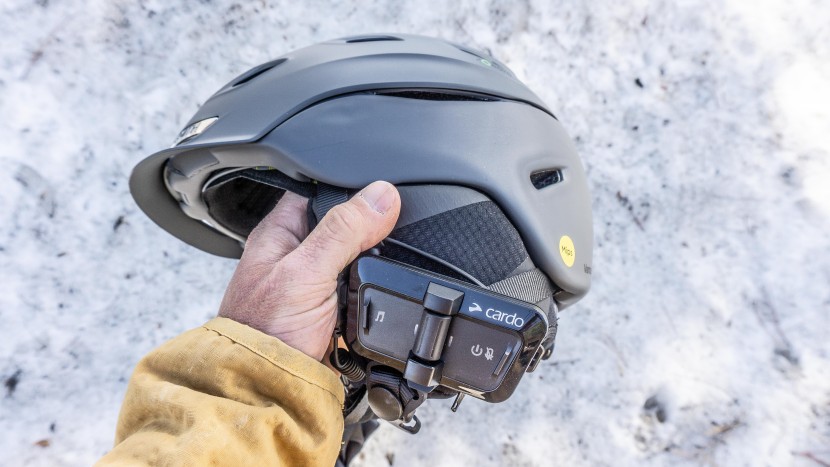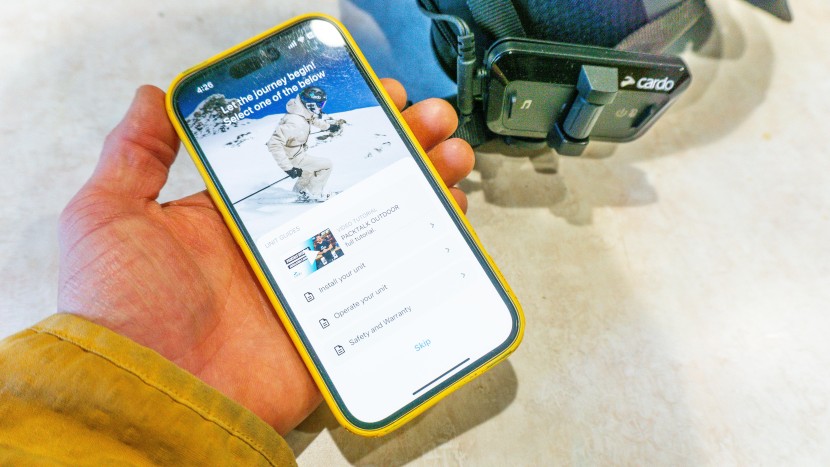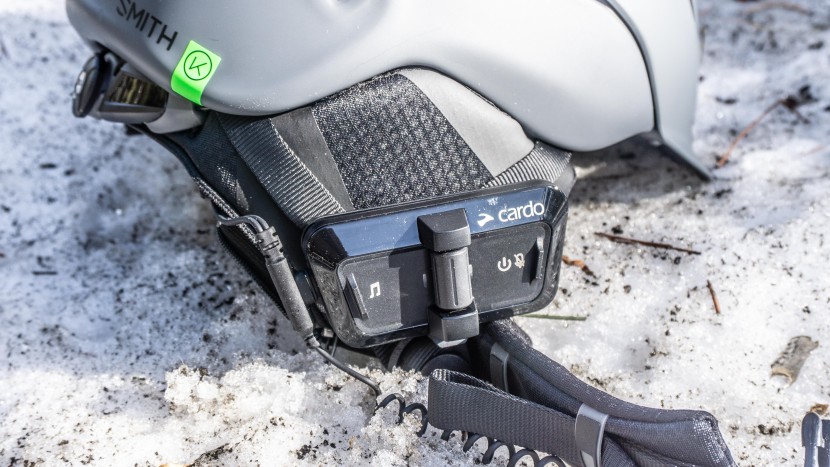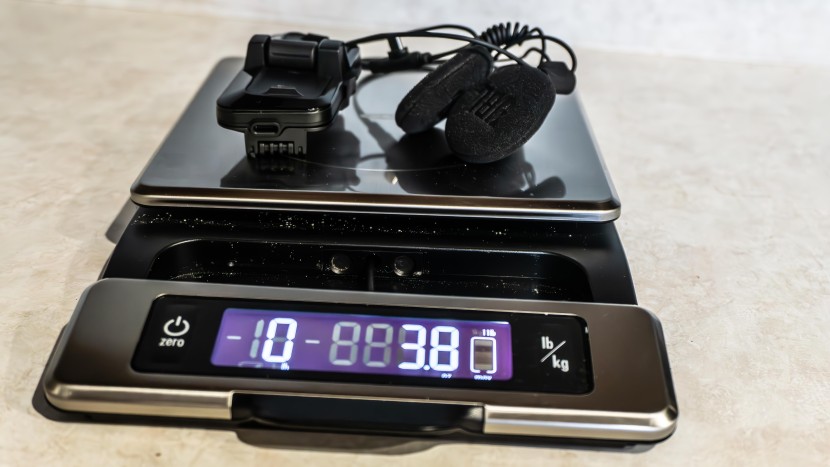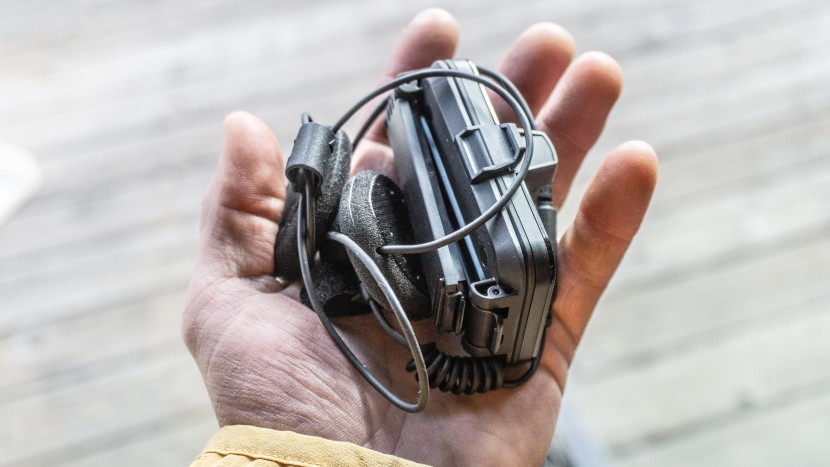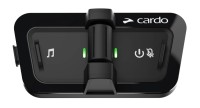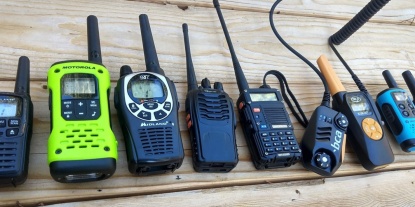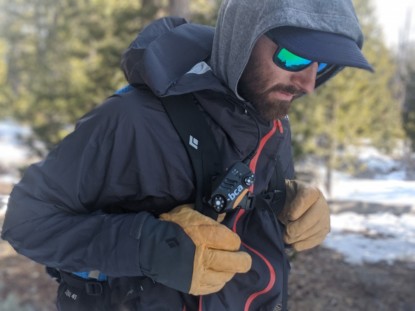
Our Verdict
Our Analysis and Test Results
We logged weeks of real-world testing with the Cardo Packtalk Outdoor to examine key performance metrics like range, ease of use, and battery life. While we found this to be an effective radio for the specific usage of resort skiing and downhill mountain biking, it wasn't our favorite option for activities like hiking or climbing due to the wired design. Continue reading to find out if this is the right model for you and your needs.
Range and Clarity
Ultimately, this option came in around average, though its 40mm JBL speakers offered excellent clarity. Uniquely, this device utilizes mesh communication to connect to one another, forming a web-like data structure, sort of like an upgraded Bluetooth connection.
The Cardo Packtalk Outdoor doesn't have a particularly long range when communicating with only one other radio, with a max distance of .7 miles in clear line of sight and approximately .5 miles of max distance with minor obstructions, including trees or brush. Uniquely, each Packtalk device serves as a miniature radio repeater of sorts due to the dynamic mesh communication system. Range can be substantially increased when you have three or more radios communicating with one another, up to reportedly 15 riders. In our testing, we only had 2 devices so we can't speak firsthand to the extended range of 3 or more users, and many shoppers may find it more practical to only own a pair of these fairly pricey devices.
Within the context of skiing or mountain biking, we found the range of the Cardo Packtalk Outdoor to work fairly well, especially when right next to your group. However, we did have some challenges with the range when substantially separated from our riding partners. As previously mentioned, the approximate range with tree obstruction landed around .5 miles at most, and most ski areas in the western U.S. have a much larger expanse. Fortunately, the “open mic” system allows one to simply keep riding around a resort and, if you get close enough, re-establish communication without having to push a single button, just keep verbally checking in. Ultimately, if you need a radio to communicate with your family or friends on the ski or mountain bike hill, this radio is likely to meet your needs, just don't stray too far from the group or have a pre-determined meet-up location if separated. For sports like climbing, where close proximity is guaranteed, this range is certainly sufficient.
Ease of Use
The Cardo takes a little time to learn, but it comes with features you rarely find in a walkie talkie and they may be exactly what you need. Once we got comfortable with it, the model felt intuitive for regular use and landed above average in our lineup. One important note: it performs best with a helmet. Yes, you can buy Cardo-specific earbuds for helmet-free activities, but the wires can be tricky to manage.
The Packtalk Outdoor requires more setup than a typical one-piece walkie talkie since it has three parts: the main unit, the main unit's holder, and wired headphones that are attached to a wired microphone. After getting your helmet set up with this radio, we'd recommend leaving the Packtalk integrated with the helmet, since it isn't the easiest to take on and off each outing. Additionally, Cardo includes a few different styles of radio attachment for your helmet: a sticky-back holder that we wouldn't recommend taking on and off repeatedly, and a more friendly clip-backed holder that is easier to move around to different helmets and can even be used on a backpack.
Depending on the helmet, you may also need to install velcro (which is included with the radio) so that the headphones are in the optimum location. For mountain biking, we had better luck utilizing this radio system with full-face helmets, which cover the ears and make it easier to install the headphones compared to the half-shell models, which required using earbuds (again, these aren't included).
Outside of the radio system installation, Cardo offers an app for connecting devices via Bluetooth, which was intuitive to use. Once we had all systems operational, we enjoyed the ease of open-mic communication with our ski partners, and we could even go completely hands-free by asking Cardo to control the unit for us, whether turning on music, turning up the volume, or answering a phone call. Even without going hands-free, we found the buttons and wheel fairly easy to use with gloves. As mentioned previously, the Packtalk Outdoor is best for very specific uses: resort skiing/riding or downhill mountain biking. If your intended sports fall outside of these activities, you're unlikely to find the Packtalk as user-friendly, with the wired earbuds and microphone more cumbersome than simpler walkie talkies.
Weather Resistance and Durability
The Cardo Packtalk Outdoor did well in the weather resistance and durability metric, coming in above average. This is a crucial area for a ski-specific radio and our findings gave us confidence in using the Cardo in more stormy settings.
The Cardo Packtalk Outdoor boasts an impressive IP67 certification, which means it's dust-tight and can be submerged in one meter of water for up to 30 minutes, though we recommend not intentionally dunking this device. Throughout our rigorous testing process, the Cardo offered consistent performance, and we never encountered any clarity issues, even during storms. The two aspects of this model that decreased its score slightly was the wired construction, which did get caught on brush in rare circumstances while hiking, and the main unit's cradle, from which the device did pop out a couple times when our testers experienced a crash and a treebranch encounter. These issues came up very infrequently, and most resort riders will be happy with the durability of this option.
Battery Life
The battery life of the Cardo was good, but not great. Our team wasn't particularly surprised by this when considering the size of its battery and the fact that the Cardo powers two very nice JBL headphones.
We found an average battery life of one long day or two shorter days with the Cardo Packtalk Outdoor. For resort riding applications, this radio is likely to meet your needs and is easy to charge each evening before your next lift-accessed adventure. Cardo's reported battery life of 10 hours is similar to our findings, though it all depends on how much you're actually using the radio and how often you're jamming to music. For shoppers needing an option for multi-day camping trips and other lengthy outings, we'd recommend looking elsewhere.
Weight and Size
The Cardo was a unique model to evaluate for the weight and size metric, with packable components but a bunch of wires otherwise not found in the competition.
While the Cardo Packtalk Outdoor is a fairly lightweight model, it has over a foot of wires (including the microphone and headphones). When neatly tucked inside a helmet, you're unlikely to notice the wires, but if going on a hike, it was more cumbersome than much of the competition. When the entire device is being stored, it does pack down small.
Should You Buy the Cardo Packtalk Outside Radio?
The Cardo Packtalk Outdoor is great for seamless communication while riding in the ski area or mountain bike park. Once integrated into your helmet, it's easy to stay in contact with your friends and family, and even allows you to listen to music, which automatically mutes when someone starts talking. If you're shopping for a versatile walkie talkie, we'd recommend you look elsewhere, since the Cardo's wired design requires earbuds if not using a helmet with earflaps, making it more cumbersome for climbing or hiking.
What Other Walkie Talkies Should You Consider?
Take a look at the Rocky Talkie Mountain Radio if you're needing more of a do-it-all option, which can also be paired with a wired microphone if you need to more easily hit the mic button. If you like the open-mic design of the Cardo, take a look at the Milo Action Communicator, which doesn't require you to push a button to talk, though it isn't quite as durable.
| Awards | A Great Option for Resort Skiing and Riding |
|---|---|
| Price | $495 List Check Price at Amazon |
Overall Score  |
|
| Star Rating | |
| Bottom Line | This unique radio offers a design that’s great for resort skiing and downhill mountain bike riding, as long as it's in your budget |
| Pros | Excellent sound quality, great for hands-free communication, feature-rich, decent weather resistance |
| Cons | Best for specific applications, slower setup time, so-so battery life, hard on the wallet |
| Rating Categories | Cardo Packtalk Outdoor |
| Range and Clarity (30%) | |
| Ease of Use (25%) | |
| Weather Resistance and Durability (15%) | |
| Battery Life (15%) | |
| Weight and Size (15%) | |
| Specifications | Cardo Packtalk Outdoor |
| Measured Weight (Single Radio, with Batteries) | 3.8 oz |
| Watts | Not listed |
| Dimensions Body Only | 4" x 3" x 3.5" |
| Battery Capacity | Not listed |
| Battery Type | Not listed |
| Rechargeable | Yes |
| Charge Via USB | Yes |
| Frequency Range | Dynamic Mesh Communication |
| Channels | N/A |
| Privacy Codes | N/A |
| Keypad Lock | No |
| NOAA Weather Alerts | Yes |
| VOX | Yes |
| Scan Function | No |
| Clips to Pack | Yes |


